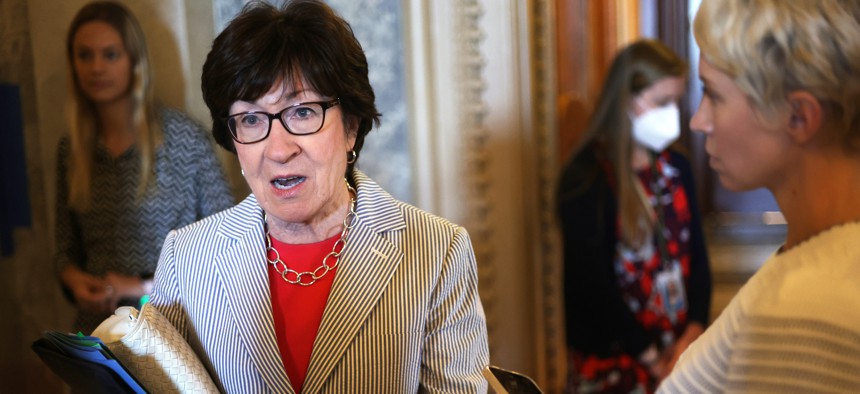Why Flexibility for States is a Central Part of the Gun Safety Deal

Sen. Susan Collins, Republican from Maine Getty Images
Details of the package are still coming into focus. But senators are emphasizing that states will hold heavy sway when it comes to shaping the red flag laws the legislation seeks to incentivize.
U.S. senators who were involved in negotiating a framework for a deal on federal gun legislation told Route Fifty they envision giving states flexibility over designing so-called red flag laws.
Though the bipartisan group of 20 senators has not provided details of the framework, they did say in a statement released Sunday that a key element is federal financial incentives to encourage states to pass laws that allow courts, at the request of law enforcement, to take away guns from individuals considered to be a risk to themselves or others.
“We’re not mandating red flag or yellow flag laws, but what we are doing is incentivizing them,” Sen. Susan Collins, a Maine Republican who endorsed the framework, said in an interview.
Maine passed a law in 2020 that, in contrast with other states’ red flag laws, requires a judge and a medical provider to agree a firearm should be seized. Other states that have enacted such laws only require an order from a judge at the request of law enforcement, or a request from co-workers, school officials or family members.
“Maine has an excellent yellow flag law that has lots of due process,” Collins said, adding that the federal dollars would help the state pay for the medical assessments. Senate negotiators, though, haven’t come up with a dollar figure yet, she said.
Sen. Lindsay Graham, a South Carolina Republican who also endorsed the framework, said the group plans to create a bill that would give discretion to states to design their laws, but within limits.
“It’s a states issue,” he told Route Fifty, “but it has to be constitutional.”
There are no guarantees, however, that the bipartisan framework would pass the full Senate. Several senators said they are waiting to see the details before deciding whether to support it.
Sen. Bill Cassidy, a Louisiana Republican who also endorsed the framework, indicated that some existing state red flag laws have issues that need to be sorted out.
“We want to respect federalism, recognizing that states have taken different approaches,” he said in an interview with Route Fifty. “But we would want a state … to do a red flag law right. We would want to make sure that they granted due process. Some [states' red flag laws] right now will not meet the definition of due process as we have. So we would straighten that out.”
Cassidy, though, declined to elaborate on which states he was referring to.
Some Strides Forward
Though it falls short of more extensive reforms pushed by gun control advocates and House Democrats, the Senate framework includes additional funding for mental health services and school security. It also creates a more rigorous background check process for 18 to 21 year olds.
If states are given discretion over designing their red flag laws, it would lead to an array of laws as now exists around the country. The existing red flag laws in 19 states and Washington, D.C. have a range of requirements for the level of proof to remove weapons. Some have lower legal bars, like “reasonable doubt,” to the stronger ones, like “clear and convincing evidence.”
Even if Congress gives more flexibility to states, it’s unclear how many more would enact such laws. Some Republican governors have expressed concern about red flag laws, saying that taking away firearms would violate Second Amendment rights.
Kery Murakami is a senior reporter for Route Fifty.
NEXT STORY: In Pennsylvania, GOP State Lawmakers Look to Impeach Philadelphia District Attorney






